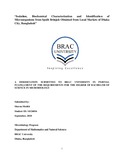Isolation, biochemical characterization and identification of microorganisms from spoilt brinjals obtained from local markets of Dhaka city, Bangladesh
Abstract
Vegetables are the most common food item in our everyday life. And brinjal is the most popular one. Starting from tradditionl curries to various Italian, French, Arabian cuisines brinjal is quite wellknown. It has vast nutritional value also. This study was done to isolate, identify, to see the temperature tolerance and enzymatic activity of the microorganisms responsible for the spoilage of brinjals. Six spoilt brinjal samples were collected from from various vegetable markets of Dhaka city and cultured using various selective and differential agar media using spread plate technique. A total of 53 bacterial isolates were identified where Eshcherichia coli and Shigellaspp. showed the highest prevalence 9 (16.98%), followed by Vibrio spp. and Bacillus spp. 8 (15.09%), Salmonella spp. 7(13.21%),Klebsiella spp. 6(11.32%), Staphylococcus spp. 4(7.55%) and Pseudomonas spp. 2(3.77%)by using preliminary tests, plating on selective media and biochemical tests. Again in the cellulase degradation test done by Congo-Red Agar or CMC agar (Carbooxy-methyl-cellulose agar) only Klebsiella spp., Shigella spp. and Salmonella spp. showed positive results. These microbes were grown in three temperature ranges to observe their ability of growth. After incubation, it was seen that none of 53 isolates were able to grow in 4 and 60 whereas all of the isolates 53 (100%) could grow in the room temperature 25. This result indicates that all the isolates were strictly mesophiles and no thermophiles or sacrophiles were present in the suspected bacterial isolates.

